

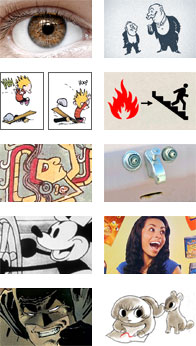
In recent years, I’ve lectured at hundreds of universities, conferences, museums, corporations, studios, festivals, and government organizations around the world.
I enjoy giving talks. It's an art form all its own and I've had fun exploring its potential and pushing its boundaries.
My lectures are picture-based; fast-changing cascades of hundreds of images, synchronized to my words. No bulleted lists or reading text from the screen. Words and pictures work together interdependently to create a unique and memorable learning experience.
Thanks to the direct, unmediated nature of images, I can tackle complex and challenging ideas in my lectures in a way that's still accessible to a wide range of audiences. I've given nearly the same talk to Silicon Valley engineers and to middle-school students in China without either audience feeling talked down to or overwhelmed.
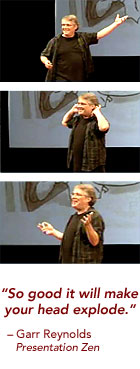
Past hosts have included the TED Conference, Harvard, Google, Pixar, MIT, Blizzard, EA, Stanford, NYU, Texas A&M, DARPA, Shanghai American School, the Sydney Opera House, and many others.
The visual lecture usually lasts a bit under an hour (plus Q & A for as long as people are in the mood) but length can be adjusted a bit if needed.
The newest incarnation of the talk is Comics and Visual Communication, a look at the intersection of comics, cartooning, and the broader world of communicating and learning through images. It's the most far-ranging of my talks so far. Also the funniest, thanks in part to some bone-crushingly awful infographics. :-)
Topics include: The unique power of cartoons, comics as “writing with pictures,” facial expressions and body language, visual illiteracy and its consequences, the elements of visual communication across disciplines, clarity and cognition, comics in digital environments, the state of the graphic novel, and the role of stories in our everyday lives.
For pricing and availability, please contact thescottmccloud@gmail.com.
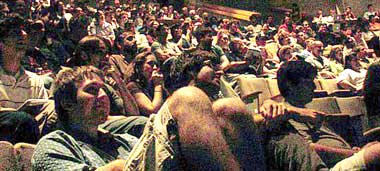
At RIT. Photo by Matt Bernius.
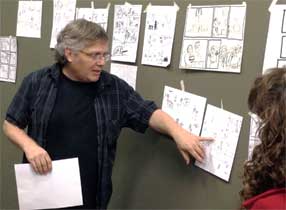
LA Academy of Figurative Art. Photo by Matthew May.
In the Summer of 2002, I created a five-day seminar in comics storytelling for the Minneapolis College of Art and Design. I've since developed one, two and three-day versions and, in some cases, expanded those ideas into semester-long classes. I've also developed variations of the workshop for interaction designers and short informal sessions for educators and librarians.
Past hosts for the workshop include MIT, Blizzard, the LA Academy of Figurative Arts, the Boston Arts Academy (a magnet high school), Georgia Tech, NYU/SVA, Philadelphia's University of the Arts, and a 3-day retreat in Spain for Disney comics writers. Hosts for the longer multi-week versions include Eastern Michigan University and Austin Peay State University.
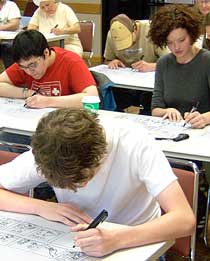
Making comics in Juneau, Alaska.
The workshop Comics: Theory and Practice (usually 2-3 days) combines in-class visual lectures, discussions, and intensive hands-on exercises focused on the art of making comics. Strong emphasis is given to developing clarity, storytelling skills, and personal expression. Students learn and apply a variety of techniques for presenting narratives through comics, as well as a wide arsenal of skills applicable to any form of graphic communication. The course culminates in the creation of a short comics feature, written and drawn by each student.
No drawing experience required. This is a class about visual decision-making (“writing with pictures”) not technical rendering. Both beginners and experienced artists are welcome and I provide all necessary materials.
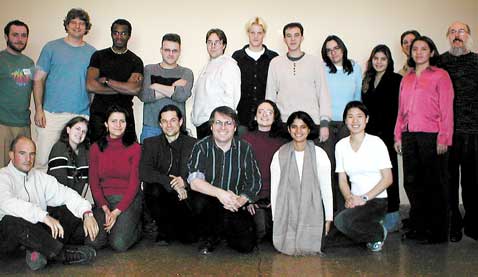
Graduate student workshop; Massachusetts Institute of Technology.
The workshops are hard work, but also a lot of fun. Students often stay in touch with each other afterward (I also make it a point to quickly learn everyone's name, sometimes remembering them years later). Workshop alumni include Google Doodle team lead Ryan Germick, graphic facilitator Brandy Agerbeck, RSAnimate’s Andrew Park, and Adventure Time creator Pendleton Ward.
For pricing and availability, please contact thescottmccloud@gmail.com.
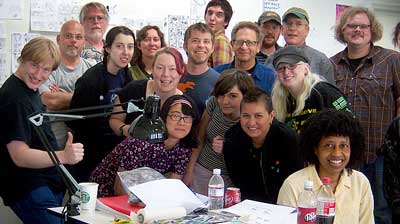
Group shot at the Pacific Northwest College of Art.

"The best Powerpoint presentation I've ever seen didn't use a single bullet point. It was performed by Scott McCloud..."
-- Tom Negrino
Creating a Presentation in Powerpoint
"...[McCloud] proved a personable, highly knowledgeable and engaged instructor, one who plainly cared and had thought a great deal about his subject. His ability to distill, organize and present his material seemed appreciated by and productive for his students."
-- Rich Kreiner
The Comics Journal